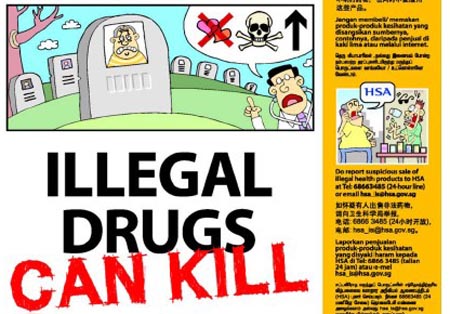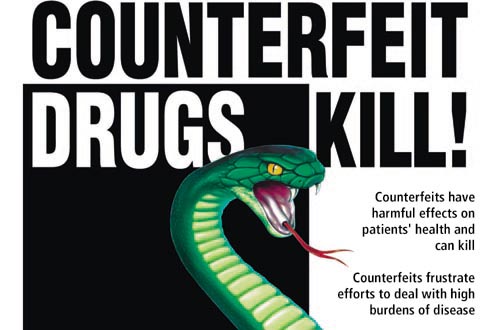The INTERPOL operation codenamed Pangea targeted internet pharmacies in ten countries that were selling counterfeit pharmaceuticals. Operation Pangea involved regulatory agencies associated with INTERPOL from the United States, United Kingdom, Australia, Canada, Germany, Ireland, Israel, New Zealand, Singapore and Switzerland.
The internet pharmacies that were raided as result of the operation were primarily sellers of prescription drugs for conditions such as diabetes, obesity and hair loss but also involved internet pharmacies selling ancillary bodybuilding drugs (“Interpol Media Release: Illegal online medicine suppliers targeted in first international Internet day of action,” November 13).
The first international Internet day of action co-ordinated by the Permanent Forum on International Pharmaceutical Crime, INTERPOL and the World Health Organisation’s (WHO) International Medical Products Anti-Counterfeiting Taskforce (IMPACT), targeting the illegal online sale of medicines to the public has resulted in a series of arrests and the seizure of potentially harmful medicines in operations carried out around the world.
Codenamed Pangea, the operation focused on those individuals behind Internet sites which illegally sell and supply unlicensed or prescription-only medicines claiming to treat a range of ailments.
While steroids and steroid pharmacies were not specifically targeted, Operation Pangea has significant ramifications for international steroid distribution. The most significant consequence results from a new definition of counterfeit drugs proposed by a World Health Organization’s (WHO) funded body allegedly supported by pharmaceutical multi-national corporations (MNCs).
The WHO International Medical Products Anti-Counterfeiting Taskforce (IMPACT) has proposed a broad new definition of “counterfeit drugs” that reclassifies practically all commercially available anabolic steroids as “counterfeit” unless it is manufactured by a pharmaceutical multi-national corporation (MNC). This means that 99% of commercially available anabolic-androgenic steroids (AAS) available through internet pharmacies are defined as “counterfeit” regardless on the actual contents of the product. While Operation Pangea is marketed as protecting the public health from “illegal, immoral” and “substandard, tainted or counterfeit products,” it also conveniently creates various forms of barriers to block inexpensive, generic pharmaceuticals produced by non-pharm MNCs (“New definition of counterfeit worries drug cos, NGOs,” November 17).
The new definition proposed by IMPACT considers drugs as counterfeit if there is a false representation about its identity, history or source. Besides, if similar deviations are found in packaging, container and labelling, the drugs will also be deemed counterfeit, even if they contain the right chemical ingredient. This is not about quality. An attempt is being made to link packaging and labelling with the efficacy and quality of drugs, an industry source who was part of the meeting said.
Indian drugmakers have now emerged as a key player in the global drug industry and have eaten into the business of global majors. As patent of most top blockbusters drugs are set to expire in the next few years, global pharma companies are under pressure to maintain their sales.
Indian industry players say global pharma MNCs are now putting up barriers in different forms to block India made drugs. Earlier in May this year, the Indian health ministry and the industry had jointly opposed the definition of counterfeit drug as suggested by IMPACT.
The intensified and coordinated international law enforcement action also inevitably increases the number of customs seizures as agents spend more time scanning international mail searching for and seizing illegally imported pharmaceuticals of all types, not just controlled substances as exemplified in the “international internet day of action against the illegal sale of online medicines” on November 12, 2008.
In the United States, U.S. Immigration and Customs Enforcement (ICE), U.S. Customs and Border Protection (CBP), the Food and Drug Administration Office of Criminal Investigations (FDA-OCI), and the U.S. Postal Inspection Service (USPIS) all participated in Operation Pangea joining with INTERPOL to protect the public health of U.S. citizens (“National Intellectual Property Rights Coordination Center partners take part in international day of action on illegal pharmaceuticals,” November 12).
Representatives of the IPR Center partner agencies assisted CBP personnel as they processed international mail, particularly pharmaceuticals, at the four facilities. The participating agencies coordinated the expertise of their respective units to target, interdict and investigate the illicit importation of goods that pose a health and safety risk to consumers.
As a result of the surge operation, approximately 635 international mail parcels were physically examined; 18 were seized. The contents of the seized parcels included counterfeit Viagra, Cialis, steroids and Xanax. The IPR Center partner agencies will review the seizures to develop evidence for possible use in the initiation of criminal investigations and the eventual crackdown on U.S. and international-based pharmaceutical websites.“The importation of substandard, tainted or counterfeit products violates U.S. laws and regulations and threatens public health and safety as well as the economic well being of the U.S.,” said Julie L. Myers, Department of Homeland Security Assistant Secretary for ICE. “Our ability to work together across the federal government and with agencies around the world is a strong and appropriate response to a growing international threat.”
“The Postal Inspection Service is responsible for keeping illegal, immoral or unsafe items out of the U.S. Mail. We will continue to contribute to the Operation Pangea Task Force so postal customers and employees won’t have to think twice about the safety of the packages shipped into the United States,” said Zane M. Hill, Deputy Chief Postal Inspector, U.S. Postal Inspection Service.
While the United Kingdom avoided involvement in the United States Drug Enforcement Agency Operation Raw Deal, the UK Medicines and Healthcare products Regulatory Agency (MHRA) was a major participant in the INTERPOL coordinated Operation Pangea shutting down seven UK-based internet pharmacies including at least one website that sold ancillary medications, presumably drugs like Nolvadex and Clomid, to bodybuilders who used anabolic steroids (“Press release: UK medicines investigators take part in international operation to tackle illegal Internet medicines,” November 13).
MHRA investigators visited 12 residential and commercial addresses in the UK relating to seven internet sites believed to be selling unlicensed medicines such as Benzylpiperazine (BZP) illegal highs and Kamagra (used for male impotence) or prescription-only medicines claiming to treat conditions such as diabetes, impotency, obesity, hair loss and male breast growth as a side effect from bodybuilding steroid abuse. Yesterday’s visits were conducted in Highgate, Muswell Hill and Wembley (London), Peterborough, Bournemouth, Ramsgate and Canterbury (Kent), Greenford (Middlesex) and Kingston (Surrey). The police accompanied the MHRA investigators on some of the visits.
MHRA investigators seized over a thousand packs of unlicensed medicines, a number of computers and related documentation. In addition, all of the UK website Internet Service Providers (ISPs) have been contacted to close down the infringing websites and in one case to seek compliance by removing the illegal products.
In Ireland, the Irish Medicines Board, Revenue Commissioners and Irish Customs Service collaborated with INTERPOL in Operation Pangea to shutdown an internet pharmacy hosted in Ireland that “allowed customers to link into internet sales of prescription-only medicines from a website based outside this country” (“Website shut down over sale of medicines,” November 14).
The body said it had visited two premises this week, one in Kerry and another in Dublin, in connection with a website hosted in Ireland.
The website was operating as a facilitator linking potential purchasers of prescription only medicines to another website outside of Ireland, it said in a statement.
The Irish website has now been decommissioned. As part of its follow up, the IMB is liaising with counterparts in other countries on the matter.
Under Irish law, the sale of prescription-only medicines by mail order or online is banned.
In Israel, the Israel Health Ministry’s Unit for the Fight against Pharmaceutical Crime and Israel Police raided various facilities and arrested individuals associated with selling prescription pharmaceuticals illegally (“Israel joins world effort to halt counterfeit drug sales,” November 16).
Inspectors went to the Tel Aviv package warehouse of the Israel Postal Company and other facilities last week, seizing drugs prohibited in Israel and others suspected of being counterfeit that had been shipped from India and China.
Among the drugs suspected of being fake were erectile dysfunction (impotence), anti-narcolepsy, contraceptive, antibiotic and psychotropic drugs. Some 3,000 pills were seized in Tel Aviv, with a similar number being confiscated in Haifa and Jerusalem that have not yet been examined. Three men suspected of belonging to a counterfeit drug gang were arrested by the police unit that protects intellectual property, headed by Rav-Pakad Yossi Ofir.
The newly proposed WHO IMPACT definition of “counterfeit drugs” and tightly-coordinated involvement of INTERPOL and associated regulatory agencies around the world represents yet another dimension in the war on the distribution of anabolic steroids and related bodybuilding, performance-enhancing drugs.

About the author
Millard writes about anabolic steroids and performance enhancing drugs and their use and impact in sport and society. He discusses the medical and non-medical uses of anabolic-androgenic steroids while advocating a harm reduction approach to steroid education.


Leave a Reply
You must be logged in to post a comment.